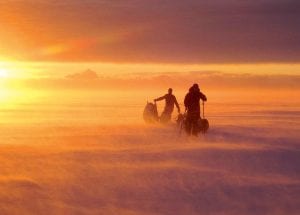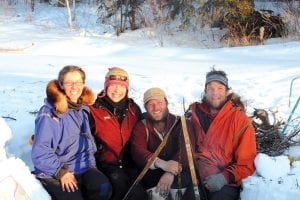The wind whipped up for three days when the team from North American Odyssey was crossing Great Bear Lake in Canada. All told, Dave and Amy Freeman will cover 11,700 miles in their three-year adventure they are chronicling in a book and using to teach up to 70,000 students worldwide in their outdoor classroom series. The Freeman’s live in Lutsen when they aren’t out in the bush.

Dave and Amy Freeman of Lutsen have just finished up the third leg of an 11,700-mile expedition that will include six trips and take three years to complete.
The Freemans, along with Ely residents Van Conrad and Ellen Root, recently finished a 900-mile dogsled, cross-country ski trip that began on the banks of the Mackenzie River at Norman Wells, Northwest Territories on February 7 and ended in Fort Resolution on Monday, April 11.
Along the way the adventurers stopped to visit First Nation communities Tulita, Deline, Gameti, Whati, Behchoko, and Yellowknife. The expedition team gave presentations and dogsled rides at local schools.
In April of 2010 the Freemans began a three-year, 11,700-mile kayak, canoe and dog-powered expedition they call “North American Odyssey.”
“Our main goal is to teach elementary and middle school students about the wild places we visit,” Amy said. “However, we also give a lot of talks for adult audiences and we have a website www.NorthAmericanOdyssey.com, which is geared for the general public.”

(L-R) Ellen Root, Amy and Dave Freeman, and Van Conrad, recently completed a 900-mile dogsled trip through northern Canada as part of the Freeman’s North American Odyssey project. The foursome uses the outdoors as their classroom. They stopped at villages and towns along the way and gave presentations and dogsled rides to kids and villagers, and gave updates online to as many as 70,000 students worldwide that follow them on the Internet.
The Freeman’s began their journey on the Pacific Coast studying temperate rainforests and marine life on the Pacific Northwest—a first of six stages in their quest to highlight North America’s wildest places,
The expedition is also meant to reduce their carbon footprint, simplify their lives and urges people to get outside and enjoy nature.
The Freeman’s have about 70,000 schoolchildren from around the globe who follow them through the Internet.
Dave, who has a degree in anthropology and biology from the University of Colorado in boulder, started the Wilderness Classroom with fellow Cook County resident Eric Frost in 2001. “Eric has returned to classroom teaching, but he was instrumental in shaping the educational components of our program. I met Amy in 2005 and she started working for the Wilderness Classroom in 2006,” said Dave.
As a youngster, Amy, who has undergraduate degrees in art and psychology from Macalester College in St. Paul and a masters degree in art therapy from the School of the Art Institute of Chicago, came to the North Shore and the Boundary Waters with her family from St. Paul several times a year. Dave, who is from LaGrange, Illinois, first came to Cook County when he was 13 with his dad.
“I was hooked and tried to convince anyone who could drive to take me to Sawbill Lake for a canoe trip,” Dave said.
When asked how their trips are selected, Dave answered, “We choose our routes in a variety of ways. For the North American Odyssey we are trying to visit some of North America’s most important intact ecosystems. Places like the Great Bear Rainforest in British Columbia and Alaska. Tombstone Mountains and Peel watershed in the Yukon, and North Shore of Lake Superior.
“We feel these large, relatively undeveloped areas play a very important role in the health of the planet, and on both local and global levels and need to be protected. One of our main goals is to show the beauty and importance of these wild places.”
Funding for their trips comes from a variety of sources, said Dave. “We are funded through grants, private donors, and a variety of corporate sponsors. We are lucky to have a lot of companies from Minnesota that support our program. Wenonah, Granite Gear, Steger Mukluks, Winter Designs, and Northern Woolens are all Minnesota companies supporting our work. We also receive funding directly from schools through fees paid for school assemblies.”
During their travels Dave and Amy have met many kind people. “While dog sledding, we were invited to stay in people’s homes, invited out to dinner, etc.
“The warm receptions extend beyond this expedition too. Back when we were doing the Trans-Amazon Expedition, paddling our canoe in Peru and Brazil, we would be invited to stay in people’s homes as well. We were a group of six, so most often people would tell us that we could stay in their houses and so we would have enough room, they would stay at their brother’s or their aunt’s place for the night! It is amazing how nice people are when you enter into a community using a traditional or unique mode of travel,” said Amy.
So far a combination of luck and skill have kept the couple and their crews safe. “The wildest thing that happened this winter was a big storm that pinned us down on Great Bear Lake for three days. The winds were estimated at 60 miles an hour and at times it was hard to see things 50 feet in front of you,” Dave said.
Otherwise, he added, “I am happy to say that we have never had any major injuries or mishaps.”
Once the North American Odyssey ends Dave and Amy will chronicle their adventures in a book. The couple will then plan their next outdoor classroom experience while maintaining their home in Lutsen on The Grade road.
“Before we settled down up here, we had been spending our summers here for years. Dave started working at Sawbill in 1994 and he has owned property on The Grade since 2005. I began guiding kayak trips at Superior Coastal Sports in 2004. It was 2006 (after kayaking around Lake Superior together) when we really became residents, living at our place on The Grade,” Amy said.


Loading Comments